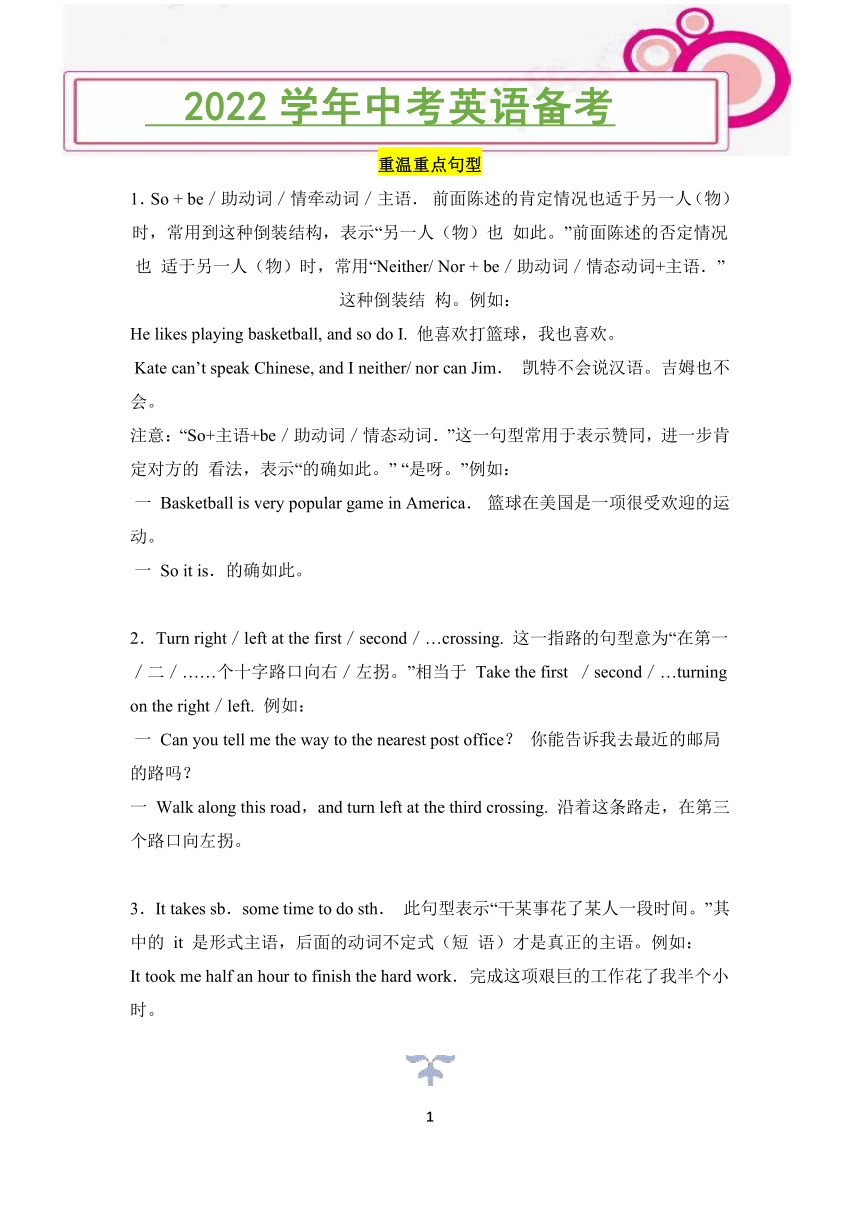
重温重点句型 1.So + be/助动词/情牵动词/主语. 前面陈述的肯定情况也适于另一人(物)时,常用到这种倒装结构,表示“另一人(物)也 如此。”前面陈述的否定情况也 适于另一人(物)时,常用“Neither/ Nor + be/助动词/情态动词+主语.”这种倒装结 构。例如: He likes playing basketball, and so do I. 他喜欢打篮球,我也喜欢。 ?Kate can’t speak Chinese, and I neither/ nor can Jim. 凯特不会说汉语。吉姆也不会。? 注意:“So+主语+be/助动词/情态动词.”这一句型常用于表示赞同,进一步肯定对方的 看法,表示“的确如此。” “是呀。”例如: ?一 Basketball is very popular game in America. 篮球在美国是一项很受欢迎的运动。 ?一 So it is.的确如此。 2.Turn right/left at the first/second/…crossing. 这一指路的句型意为“在第一/二/……个十字路口向右/左拐。”相当于 Take the first /second/…turning on the right/left. 例如: ?一 Can you tell me the way to the nearest post office? 你能告诉我去最近的邮局的路吗?? 一 Walk along this road,and turn left at the third crossing. 沿着这条路走,在第三个路口向左拐。? 3.It takes sb.some time to do sth. 此句型表示“干某事花了某人一段时间。”其中的 it 是形式主语,后面的动词不定式(短 语)才是真正的主语。例如:? It took me half an hour to finish the hard work.完成这项艰巨的工作花了我半个小 时。? 4.…think/find + it + adj. + to do sth. 此句型中的 it 是形式宾语,不可用其它代词替代,形容词作宾语的补足语,后面的动词不 定式(短语)才是真正的宾语。例如:? I found it important to learn English well. 我发现学好英语很重要。? 5.What’s wrong with…? 此句型相当于 What’s the matter/ trouble with…?后跟某物作宾语时,意为“某物出 什么毛病了?”后跟某人作宾语时,意为 “某人怎么了?”例如:? -What’s wrong with your bike?你的自行车出什么毛病了? ?一 It’s broken.它坏了。? -What’s wrong with you?你怎么了?? 一 I have a pain in my head.我头痛。? 6.too…to… 在 so…that…复合句中,that 后的句子是否定句时,常与简单句 too…to…(太……而不 能……)进行句型转换。例如: ?He is so young to go to school.(改为简单句) →He is too young to go to school.? 在 so…that…复合句中,that 后的句子是肯定句时,常与简单句…enough to…进行句型 换。例如:? This maths problem was so easy that we could work it out. (改为简单句) →This maths problem was easy enough for us to work out.? 7.Sorry to hear that. 全句应为 I’m sorry to hear that. 意为“听到此事我很难过(遗憾)。”常用于对别人 的不幸表示同情、遗憾之意。例如: ?—My mother is ill, so I have to look after her at home. 我母亲病了,因此我必须在家照看她。? —Sorry to hear that. 听到此事我很难过。 8. She used to be a Chinese teacher. 她过去是一位汉语老师。? [用法]? used to + 动词原形,表示过去经常性的动作或存在的状态,含有现在不再如此之 ] 意。 [搭配]? used to do 的否定式可以是 usedn’t to do 或 didn’t use to do. ] [比较] used to do sth. 过去常做某事; be/ get used to doing sth. 习惯于做某事; be ?used to do sth. 被用来做某事。? [举例]?? 1) I used to read in bed. 我过去总是躺在床上看书。? 2)Did he use to work into the night 或 Used he to work into the night 他以前总是工作到深夜吗?? 3)I am ... ...
~~ 您好,已阅读到文档的结尾了 ~~